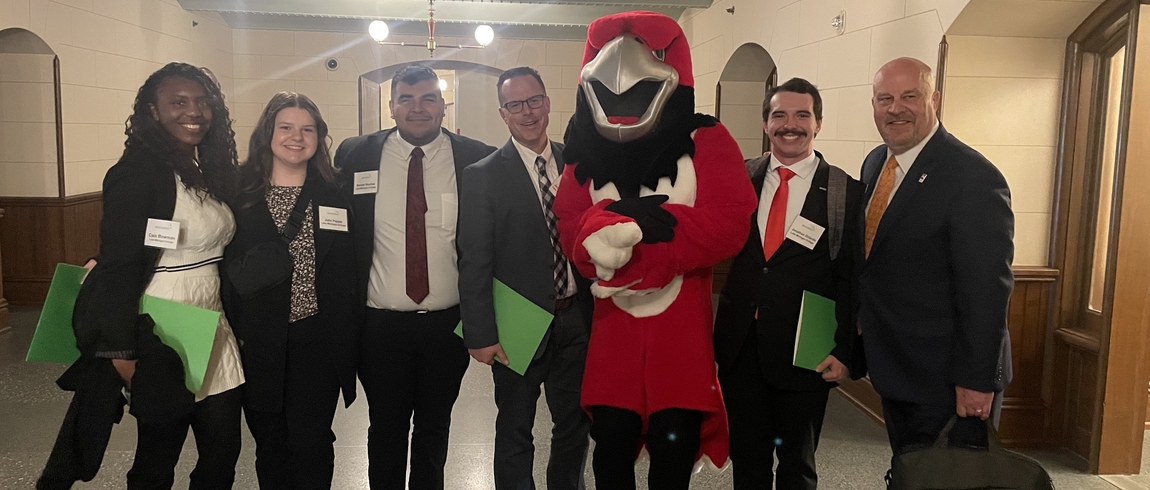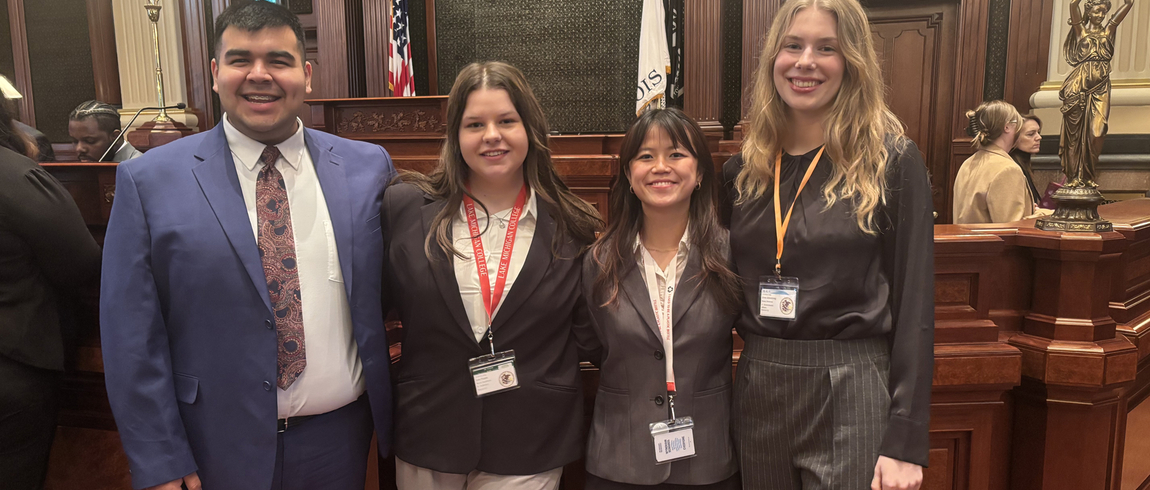Innovative technology, Ferris State partnership bolster LMC’s Criminal Justice program
Faith Gray admits it was a little odd at first talking to an actor projected onto a wall, but after a few attempts, she felt immersed in the scenarios unfolding in front of her.
“It’s as close as you can get to real life without being real life,” the Lake Michigan College criminal justice major said. “It’s very helpful understanding what police officers go through without actually having to go through it.”
Gray is talking about the MILO Range Classic system, LMC’s new simulation tool that uses interactive video scenarios to train criminal justice students on verbal techniques to defuse situations, enhance tactical judgment, and deploy the proper use of force when needed.
“In the real world, these scenarios can be life or death situations that we can now simulate in the classroom,” said LMC Criminal Justice Instructor Brad Byerle, who first incorporated the technology in his criminal justice skills class during the fall semester.
“If you watch the news, you know that the use of deadly force by police officers is currently under the microscope. Right now, law enforcement is under a lot of scrutiny,” Byerle continued. “This helps train students and future law enforcement officers how much force, if any, is needed in a given situation.”
The addition of this training tool and a newly signed partnership enabling LMC students to earn a bachelor’s degree in criminal justice through Ferris State University has only strengthened LMC’s growing criminal justice program.
The MILO system suite includes a laptop computer with preloaded scenarios, an HD projector and sound system, a hit-detection camera system, a SIRT training pistol, OC (pepper spray) device, and a taser that uses lasers calibrated with the screen.
Using branch technology, an instructor using the laptop can either escalate or deescalate a wide range of scenarios depending on a student’s response.
“If a student is doing an excellent job, I will have the actor calm down, but if a student isn’t doing a good job, I can have the situation further escalate,” Byerle said. “The actor can pull out a knife or a gun, and the student has to react to that. They have to decide, do I use force, and if so, how much force should I use?”
The system includes hundreds of realistic training scenarios, including encounters with emotionally disturbed and mentally ill citizens, intoxicated subjects, resistant and violent subjects, and autistic, disabled, and disadvantaged citizen situations.
“It’s that realistic training you can’t get elsewhere,” LMC student and Berrien County Sheriff’s Department Deputy Nicholas Sofield said. “In fast-paced situations, you have to sort of slow everything down internally and think before you act. We must make potentially life-changing decisions in a split-second, and we must think clearly in those times. This realistic training helps you train your brain to think both fast and clearly, so you don’t make the wrong decision in the field.”
Although the MILO program has only been used in the criminal justice skills class, Byerle said it could be incorporated into every course on the law enforcement track in the future.
“I think it is an essential tool,” he said. “Every law enforcement officer has to qualify on a range but qualifying on a range isn’t the same as interacting in a deadly force simulation. Anybody with the right training can point at a target and shoot. This system requires you to decide how much force to use and if deadly force is needed. Can I accurately shoot when my adrenaline is up? That is what this is teaching that just shooting on a range doesn’t.”
“The whole point of the MILO simulation is to deescalate these different scenarios properly,” Gray added. “It’s about de-escalation so that you don’t have to use force against them, but it also helps you understand when you may have to use force.”
Byerle, who happens to be a Ferris State alumnus, is equally excited about LMC’s partnership with his alma mater. The signed articulation agreement allows students seeking a bachelor’s degree as a criminal justice generalist to take all classes at LMC’s Benton Harbor campus. Up to 79 LMC credits can be used toward that degree, leaving, at most, 41 credits to be completed through Ferris State. One of the most significant benefits of the agreement is that students can finish the degree without ever leaving Southwest Michigan.
“The big advantage is you don’t have to go up to Big Rapids to finish it,” Byerle said. “For students at LMC, the furthest they will have to go is Benton Harbor or maybe Dowagiac for some classes.”
LMC student Michael Danneffel, an intern with the Berrien County Sheriff’s Department, said he had planned to finish his associate degree. Still, with the new Ferris State agreement, he intends to continue his education.
“A bachelor’s degree will help me go further in my career,” Danneffel said. “It’s great for me because I can’t go out of my way to pursue going to a university. It wasn’t in the long-term plans. Being able to do three years at LMC and just one year instead of multiple years at Ferris made it possible.”
Byerle said the Ferris State partnership, much like LMC’s similar partnership with Siena Heights, offers another choice for students who want to expand their criminal justice career path.
“Police and corrections don’t require a bachelor’s degree, but everything else in criminal justice does,” he said. “That includes any of the federal agencies. So, if you want to work for the FBI, DEA anything like that, you must have a bachelor’s degree. We have many students at LMC who want to be a probation or parole officer or go to law school, and you must have a bachelor’s degree for that. So, this is just adding another huge opportunity for our students.”



